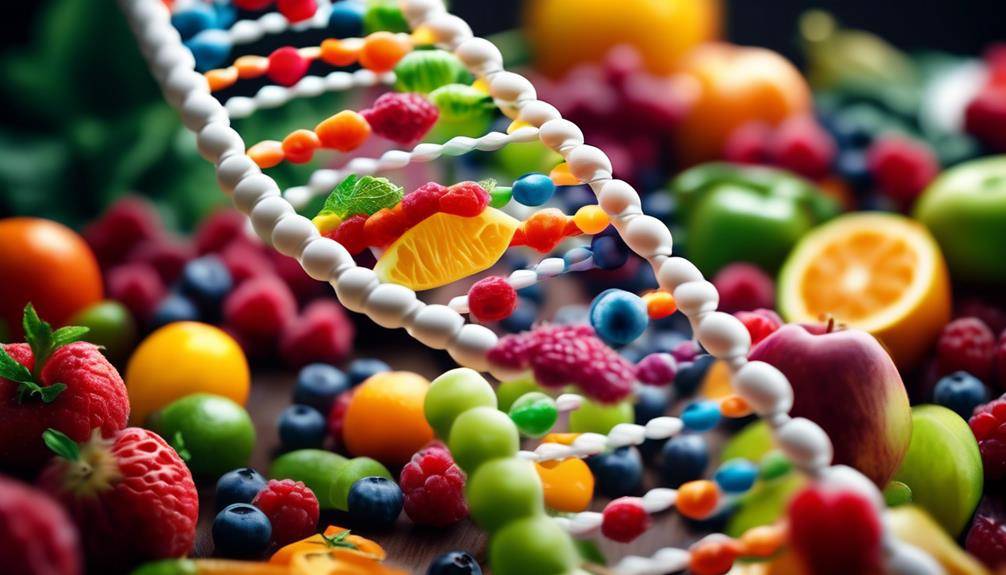What Is The Importance of Nutritional Genomics in Food

Importance of Nutritional Genomics; Imagine your body as a complex puzzle, with each piece representing a unique genetic component. Just as a missing piece can hinder the completion of a puzzle, a deficiency in your nutritional needs can affect your overall health and wellbeing. This is where the importance of nutritional genomics comes into play.
By unraveling the intricate relationship between your genes and the food you consume, nutritional genomics holds the key to unlocking a personalized approach to nutrition that can revolutionize your health. But how exactly does it work, and what does it mean for the future of food? Let’s explore this fascinating field together and discover the incredible potential it holds for optimizing your well-being and promoting longevity.
Understanding Nutritional Genomics
To understand nutritional genomics, you need to explore how our genes interact with the foods we consume. This field of study focuses on understanding the impact of genetic variations on our response to different nutrients and how our diet can influence gene expression. Genetic variations are differences in our DNA sequence, and they can affect how our bodies process and utilize different nutrients. By understanding these variations, scientists can identify individuals who may be more susceptible to certain nutritional deficiencies or at a higher risk for certain diseases.
One of the key techniques used in nutritional genomics is gene expression analysis. Gene expression refers to the process by which information from our genes is used to produce functional molecules, such as proteins. Gene expression analysis allows scientists to study how different nutrients can influence the activity of our genes. By measuring the levels of gene expression in response to certain nutrients, researchers can gain insight into how our diet can impact our health and disease risk.
Understanding genetic variations and gene expression analysis can have practical implications for our everyday lives. For example, certain genetic variations may affect how efficiently we absorb and metabolize certain nutrients. By identifying these variations, individuals can make informed decisions about their diet and choose foods that better suit their genetic profile. Furthermore, gene expression analysis can help uncover the molecular mechanisms underlying certain diseases and guide the development of targeted nutritional interventions.
The Impact of Genetic Variations
Understanding the impact of genetic variations on our response to different nutrients is crucial in the field of nutritional genomics. Genetic variations play a significant role in determining an individual’s susceptibility to certain diseases and their ability to perform in athletic activities.
Genetic variations can influence our risk of developing certain diseases. For example, certain variations in the genes involved in metabolizing nutrients can increase the likelihood of developing conditions like obesity, diabetes, and cardiovascular disease. By identifying these genetic variations, nutritional genomics can help tailor personalized dietary recommendations to mitigate the risk of these diseases. This can lead to more effective prevention and management strategies, ultimately improving the overall health of individuals.
On the other hand, genetic variations can also impact athletic performance. Certain variations in genes related to muscle function, metabolism, and oxygen utilization have been found to influence an individual’s endurance, strength, and ability to recover from exercise. Understanding these genetic variations can help athletes and coaches develop personalized training programs and nutritional strategies to optimize performance. For example, an athlete with a genetic variation associated with increased muscle strength may benefit from resistance training exercises, while another athlete with a variation linked to improved oxygen utilization may benefit from endurance training.
Exploring Gene-Food Interactions
Exploring the interactions between genes and food is essential for understanding how our genetic makeup influences our response to different nutrients and can help guide personalized dietary recommendations. Gene-diet interactions play a crucial role in determining an individual’s nutritional requirements and their susceptibility to certain health conditions. By studying these interactions, scientists aim to uncover how specific genes affect the way our bodies process and utilize nutrients, leading to a more tailored approach to nutrition.
To make this concept more relatable, consider the following scenarios:
- Imagine you have a genetic variation that affects your ability to metabolize certain vitamins. This could mean that you need higher levels of those vitamins in your diet to ensure you are getting enough for optimal health.
- Picture yourself having a genetic predisposition to lactose intolerance. In this case, consuming dairy products could lead to digestive discomfort, and your personalized nutrition plan would likely recommend alternative sources of calcium and other essential nutrients.
- Now, think about a situation where your genes influence your response to dietary fats. Some individuals may have a higher risk of developing cardiovascular disease when consuming a high-fat diet, while others may be more resilient. Understanding these gene-diet interactions can help individuals make informed choices about their fat intake and reduce their risk of developing heart-related issues.
Uncovering Personalized Nutritional Needs
When it comes to nutrition, everyone is unique. Genetic variations play a crucial role in how our bodies process and utilize nutrients. By understanding these genetic variations, scientists can uncover personalized nutritional needs and develop tailored diet recommendations. This personalized approach to nutrition can help optimize health outcomes and address individual nutritional deficiencies or sensitivities.
Genetic Variations and Nutrition
To uncover your personalized nutritional needs, genetic variations play a crucial role in determining how your body processes and responds to different nutrients. These genetic variations can influence various aspects of your health, including sports performance and mental well-being. Here are three ways in which genetic variations impact nutrition:
- Genetic variations and sports performance:
- Certain genetic variations can affect how efficiently your body utilizes nutrients like carbohydrates and fats, which can impact your energy levels and athletic performance.
- Genetic variations can also influence factors such as muscle strength, endurance, and recovery, which can affect your ability to excel in sports.
- Genetic variations and mental health:
- Studies have shown that certain genetic variations can influence how your body processes neurotransmitters, which are chemicals that regulate mood and emotions.
- These genetic variations can affect your susceptibility to mental health conditions such as depression, anxiety, and bipolar disorder.
- Personalized dietary recommendations:
- By understanding your genetic variations, healthcare professionals can provide personalized dietary recommendations tailored to your specific needs.
- This can help optimize your nutrient intake and support your overall health and well-being.
Personalized Diet Recommendations
Understanding your genetic variations is key to uncovering personalized diet recommendations and optimizing your nutritional needs. Individualized dietary guidance based on genetic variations is becoming increasingly popular as a means to improve health outcomes. By analyzing your genetic profile, experts can identify specific genetic variations that affect your metabolism, nutrient absorption, and response to certain foods.
Armed with this information, they can create a tailored meal plan that takes into account your unique genetic makeup. This approach, known as genetic-based meal planning, allows you to make more informed decisions about the foods you consume, helping you achieve your health goals more effectively. With personalized diet recommendations, you can optimize your nutrient intake, manage weight, and mitigate the risk of developing chronic diseases. By embracing this individualized approach, you can take control of your own health and well-being.
Revolutionizing Health and Wellness
Revolutionizing health and wellness through nutritional genomics offers personalized dietary recommendations, disease prevention strategies, and the optimization of nutrient absorption. By analyzing an individual’s genetic makeup, nutritional genomics can identify specific dietary needs and tailor recommendations accordingly. This approach not only helps prevent and manage chronic diseases but also allows individuals to optimize their nutrient absorption to support overall health and well-being.
Personalized Dietary Recommendations
Personalized dietary recommendations have the potential to transform health and wellness by tailoring nutrition plans to an individual’s unique genetic makeup. Through uncovering genetic predispositions and advancements in genetic testing, scientists are now able to gain valuable insights into how our genes influence our nutritional needs. Here are three reasons why personalized dietary recommendations are crucial for optimizing your health:
- Precision: By analyzing your genetic profile, personalized dietary recommendations can provide you with precise information about which nutrients your body may need more or less of, helping you to make informed food choices.
- Prevention: Genetic testing advancements allow for the identification of genetic variations that may increase your risk for certain health conditions. With personalized dietary recommendations, you can proactively modify your diet to mitigate these risks.
- Performance: Personalized dietary recommendations can also enhance athletic performance by tailoring nutrition plans to an individual’s unique genetic traits, optimizing energy levels, recovery, and overall performance.
Disease Prevention Strategies
To optimize your health and wellness, implementing effective disease prevention strategies is essential. One of the key ways to prevent diseases is through personalized nutrition plans. By understanding your genetic makeup and how it interacts with your diet, you can tailor your eating habits to reduce the risk of certain diseases. For example, if you have a genetic predisposition to heart disease, your personalized nutrition plan might include foods that promote heart health, such as fruits, vegetables, whole grains, and lean proteins.
Additionally, disease prevention strategies may involve regular exercise, maintaining a healthy weight, getting enough sleep, managing stress, and avoiding smoking and excessive alcohol consumption. By taking a proactive approach to your health and focusing on disease prevention, you can significantly reduce your risk of developing chronic illnesses and improve your overall well-being.
Optimizing Nutrient Absorption
Understanding how your genetic makeup influences your body’s ability to absorb nutrients is crucial for optimizing your health and well-being. By implementing nutrient absorption optimization techniques, you can ensure that your body is effectively absorbing the necessary nutrients from the foods you consume. Here are some practical strategies to enhance nutrient absorption:
- Eat a balanced diet: Consuming a variety of nutrient-rich foods, including fruits, vegetables, whole grains, lean proteins, and healthy fats, provides your body with the necessary nutrients for optimal absorption.
- Chew your food thoroughly: Chewing your food well breaks it down into smaller particles, making it easier for your body to absorb the nutrients.
- Pair certain foods together: Combining foods rich in iron with vitamin C-rich foods, for example, can enhance iron absorption.
Enhancing Dietary Recommendations
Improving nutritional recommendations can have a significant impact on overall health and well-being. With advancements in genetic testing and the utilization of genomic data, it is now possible to enhance dietary recommendations in a more personalized and targeted manner.
Genetic testing allows individuals to understand how their unique genetic makeup influences their response to different nutrients. By analyzing specific genes related to metabolism, nutrient absorption, and disease risk, scientists can gain valuable insights into an individual’s nutritional needs. This information can then be used to create tailored dietary recommendations that take into account genetic variations and optimize nutrient intake.
Utilizing genomic data in dietary recommendations also allows for a more precise understanding of how certain nutrients interact with specific genetic variants. For example, certain individuals may have a genetic predisposition to higher cholesterol levels. By identifying this genetic variant, dietary recommendations can be customized to include foods that help lower cholesterol levels, such as plant sterols and soluble fiber.
In addition to genetic testing, other factors such as age, sex, lifestyle, and medical history are also taken into consideration when enhancing dietary recommendations. By combining all these data points, healthcare professionals can provide more personalized and effective dietary guidance.
Enhancing dietary recommendations through the use of genetic testing and genomic data has the potential to improve health outcomes and prevent chronic diseases. By tailoring recommendations to an individual’s specific genetic profile, nutrient deficiencies and imbalances can be addressed, promoting optimal health and well-being. It is important to note that while genetic testing can provide valuable insights, it should always be used as a tool in conjunction with other factors and guidance from healthcare professionals.
Optimizing Nutrient Absorption
By harnessing the power of genetic testing and genomic data, you can optimize your nutrient absorption for improved health and well-being. Nutrient absorption optimization is essential because even if you consume a nutrient-rich diet, your body may not be able to absorb and utilize all the nutrients effectively. Here are three practical ways to enhance nutrient bioavailability and make the most of the food you eat:
- Pairing nutrients with the right foods: Certain nutrients require specific cofactors or complementary nutrients to be absorbed efficiently. For example, pairing iron-rich foods with vitamin C-rich foods can enhance iron absorption. So, try combining spinach (iron-rich) with citrus fruits (vitamin C-rich) for maximum benefit.
- Cooking and processing techniques: The way you cook or process your food can influence nutrient availability. Some nutrients, like lycopene in tomatoes, are better absorbed when cooked. On the other hand, excessive cooking or processing can lead to nutrient loss. So, aim for methods like steaming or roasting, which retain more nutrients compared to boiling or frying.
- Gut health optimization: A healthy gut is crucial for optimal nutrient absorption. Probiotics, found in fermented foods like yogurt and sauerkraut, can help improve gut health and enhance nutrient absorption. Additionally, consuming dietary fibers from fruits, vegetables, and whole grains can support a healthy gut by promoting the growth of beneficial gut bacteria.
Preventing Nutrient Deficiencies
To prevent nutrient deficiencies and ensure optimal health, it is important to prioritize a well-balanced diet that includes a variety of nutrient-rich foods. Nutrient deficiencies can occur when your body does not receive an adequate amount of essential vitamins, minerals, and other nutrients. These deficiencies can lead to various health problems, such as weakened immune system, poor growth and development, and increased risk of chronic diseases.
One way to prevent nutrient deficiencies is by following personalized nutrition plans. These plans are tailored to meet your specific nutrient needs based on factors like your age, sex, activity level, and health conditions. By working with a registered dietitian or nutritionist, you can create a plan that ensures you are getting all the nutrients your body needs.
A well-balanced diet should include a variety of nutrient-rich foods from all food groups. Fruits, vegetables, whole grains, lean proteins, and healthy fats should all be part of your daily meals. These foods provide essential vitamins, minerals, antioxidants, and other nutrients that support your overall health and well-being.
It is also important to pay attention to the quality of the foods you consume. Opt for whole, unprocessed foods whenever possible, as they tend to be higher in nutrients compared to processed foods. Additionally, be mindful of portion sizes to avoid overeating or under-eating certain nutrients.
Supplements can be helpful in preventing nutrient deficiencies, but they should not be relied upon as a substitute for a well-balanced diet. If you are considering taking supplements, it is best to consult with a healthcare professional to ensure you are choosing the right ones and taking them at the appropriate doses.
Tailoring Diets to Genetic Makeup
Now it’s time to explore the fascinating concept of tailoring diets to your genetic makeup. With advancements in nutritional genomics, scientists have discovered that our genes can impact how our bodies respond to certain nutrients. This knowledge has led to the development of genetic-based dietary recommendations and personalized nutrition plans, which take into account an individual’s unique genetic profile to optimize their health and well-being. By understanding your genetic makeup, you can make informed decisions about your diet that are tailored specifically to your body’s needs.
Genetic-Based Dietary Recommendations
Tailoring diets to individual genetic makeup is a revolutionary approach to personalized nutrition that holds great potential for optimizing health outcomes. With advancements in genomic medicine applications, scientists are now able to identify specific genetic variations that affect how our bodies metabolize and respond to certain nutrients. This knowledge has paved the way for genetic-based nutritional interventions, where dietary recommendations are tailored to an individual’s unique genetic profile.
Here are three ways in which genetic-based dietary recommendations can benefit you:
- Personalized macronutrient ratios: By analyzing your genetic makeup, experts can determine the ideal ratio of carbohydrates, proteins, and fats that will support your body’s specific needs and goals.
- Micronutrient optimization: Genetic testing can identify any genetic variations that may affect your ability to absorb or utilize certain vitamins and minerals. This information can help you make targeted dietary choices or consider supplementation to ensure optimal nutrient levels.
- Food sensitivity management: Some genetic variations can make you more susceptible to food sensitivities or intolerances. By understanding your genetic predispositions, you can adjust your diet to avoid triggering foods and reduce inflammation or digestive issues.
Genetic-based dietary recommendations provide a personalized and evidence-based approach to nutrition, helping you optimize your health and wellbeing based on your unique genetic makeup.
Personalized Nutrition Plans
Personalized nutrition plans, tailored to your unique genetic makeup, offer a revolutionary approach to optimizing your health and well-being through targeted dietary recommendations. These personalized meal plans are created based on the results of genetic testing, which can provide valuable insights into how your body processes and responds to different nutrients.
By understanding your genetic predispositions, such as how your body metabolizes certain vitamins or how it responds to specific macronutrients, you can make informed choices about the foods you consume. This allows you to optimize your nutrient intake, minimize potential deficiencies, and reduce the risk of developing diet-related health conditions. Genetic testing can provide a blueprint for designing a personalized nutrition plan that takes into account your specific genetic variations, allowing you to make dietary choices that are tailored to your individual needs.
Improving Weight Management Strategies
To improve weight management strategies, incorporating personalized nutritional genomics can provide evidence-based and practical solutions for individuals seeking effective ways to reach their weight goals. By understanding how our genes influence our metabolism and response to different nutrients, we can tailor our dietary choices to optimize weight loss and long-term weight management.
Here are three ways in which personalized nutritional genomics can improve weight management strategies:
- Precision Nutrition: Personalized nutritional genomics allows for a more precise understanding of an individual’s genetic makeup and how it interacts with their diet. By analyzing genetic variations related to metabolism, appetite regulation, and nutrient absorption, we can develop personalized nutrition plans that are tailored to an individual’s specific needs and genetic predispositions. This targeted approach can optimize weight loss efforts and improve long-term weight management outcomes.
- Identification of Genetic Risk Factors: Nutritional genomics can help identify genetic variants associated with an increased risk of obesity or weight gain. By knowing these risk factors, individuals can take proactive measures to mitigate their impact on weight management. This may include adjusting their diet or lifestyle choices to counterbalance the genetic predisposition, or seeking additional support from healthcare professionals who specialize in personalized nutrition.
- Optimization of Exercise Regimens: Nutritional genomics can also provide insights into an individual’s genetic response to exercise. By analyzing genetic markers related to muscle strength, endurance, and response to different types of exercise, personalized nutrition plans can be created to optimize the effectiveness of an individual’s workout routine. This can lead to more efficient weight loss and improved overall fitness levels.
Incorporating personalized nutritional genomics into weight management strategies allows for a more targeted and effective approach to achieving weight goals. By understanding our genetic predispositions and tailoring our diet and exercise plans accordingly, we can optimize weight loss efforts and improve long-term weight management outcomes.
Managing Chronic Diseases With Precision
Managing chronic diseases with precision requires a comprehensive understanding of an individual’s genetic makeup and how it influences the development and progression of these conditions. Precision nutrition plays a crucial role in managing chronic diseases, as it focuses on tailoring dietary interventions based on an individual’s specific genetic profile. By analyzing genetic variations, healthcare professionals can identify the unique nutritional needs of each patient and design personalized dietary plans that optimize their health outcomes.
Precision nutrition takes into account various factors such as genetic predispositions, metabolic pathways, and nutrient-gene interactions. For example, individuals with certain genetic variants may have a higher risk of developing conditions like diabetes, heart disease, or obesity. By identifying these genetic markers, healthcare providers can recommend dietary modifications that can help mitigate the risk and manage the condition effectively.
Precision nutrition also considers how an individual’s genetic makeup influences their response to certain nutrients. Genetic variations can affect the way our bodies metabolize and utilize specific nutrients, such as vitamins, minerals, or macronutrients. By understanding these interactions, healthcare professionals can tailor dietary recommendations to optimize nutrient absorption and utilization.
Moreover, precision nutrition can help improve the management of chronic diseases by identifying potential nutrient deficiencies or imbalances that may exacerbate the condition. By addressing these nutritional gaps, healthcare providers can enhance the effectiveness of treatment strategies and improve overall patient outcomes.
Promoting Longevity and Wellbeing
Promote a longer and healthier life by incorporating precision nutrition strategies into your daily routine. By understanding the role of nutritional genomics in promoting healthy aging and wellbeing, you can make informed choices to optimize your longevity.
Here are three key ways in which genetic factors contribute to your wellbeing and longevity:
- Genetic variations: Your genes play a significant role in determining how your body processes and responds to nutrients. By identifying specific genetic variations, such as single nucleotide polymorphisms (SNPs), you can personalize your nutrition to better support your unique genetic makeup. For example, if you have a genetic predisposition to low vitamin D levels, you can focus on increasing your intake of vitamin D-rich foods or consider supplementation to maintain optimal levels.
- Inflammation and oxidative stress: Chronic inflammation and oxidative stress are key drivers of aging and age-related diseases. Nutritional genomics can help you identify genetic factors that influence your body’s response to inflammation and oxidative stress. Armed with this knowledge, you can make dietary choices that reduce inflammation and support your body’s antioxidant defenses. Incorporating foods rich in antioxidants, such as fruits, vegetables, and whole grains, can help combat these damaging processes.
- Nutrient metabolism: Genetic factors can influence how efficiently your body metabolizes certain nutrients, such as carbohydrates, fats, and proteins. By understanding your genetic predispositions in nutrient metabolism, you can tailor your diet to suit your body’s needs. For example, if you have a genetic variation that affects your carbohydrate metabolism, you may benefit from a lower carbohydrate intake or focusing on complex carbohydrates to maintain stable blood sugar levels.
Incorporating precision nutrition strategies based on your genetic factors can help promote healthy aging and overall wellbeing. By personalizing your diet to support your unique genetic makeup, you can optimize your longevity and enjoy a healthier life.
Advancing Nutrigenomic Research
Advancing nutrigenomic research is crucial for uncovering cutting-edge findings and promising genetic discoveries that can revolutionize our understanding of nutrition and health. By studying the intricate relationship between our genes and the food we consume, researchers can identify specific genetic variations that influence our response to different nutrients. This knowledge has the potential to pave the way for personalized nutrition plans and targeted interventions that optimize health outcomes based on an individual’s unique genetic profile.
Cutting-Edge Research Findings
Researchers in the field of nutritional genomics are constantly uncovering new and exciting findings that shed light on the intricate relationship between our genes and the food we eat. Cutting-edge research applications and emerging trends are shaping the future of this field, offering promising insights into personalized nutrition and health. Here are three recent discoveries that have caught the attention of researchers:
- Nutrigenomics and chronic diseases: Studies have shown that certain genetic variations can influence an individual’s response to specific nutrients and dietary patterns. By understanding these genetic variations, researchers can develop personalized dietary recommendations to prevent or manage chronic diseases such as diabetes, cardiovascular diseases, and obesity.
- Gut microbiome and gene expression: The gut microbiome plays a crucial role in nutrient metabolism and gene expression. Recent research has revealed that the composition of our gut microbiota can influence how our genes are expressed, impacting various aspects of our health, including digestion, immune function, and even mental health.
- Epigenetics and dietary factors: Epigenetics refers to the modifications in gene expression that are not caused by changes in the DNA sequence itself. Emerging research suggests that certain dietary factors, such as specific nutrients and bioactive compounds, can modify gene expression patterns through epigenetic mechanisms. This opens up new possibilities for using nutrition as a tool to influence gene expression and improve health outcomes.
These cutting-edge research findings highlight the exciting potential of nutritional genomics in understanding the intricate interplay between our genes and the food we eat. As researchers continue to delve deeper into this field, we can expect even more groundbreaking discoveries that will shape the way we approach personalized nutrition and health.
Promising Genetic Discoveries
Numerous genetic discoveries in the field of nutritional genomics are revolutionizing our understanding of how our genes interact with the food we consume. These promising genetic breakthroughs hold the potential to transform the way we approach healthcare and nutrition. By identifying specific genetic variations, scientists are uncovering new insights into how individuals respond to different diets and nutrients. This knowledge opens up exciting possibilities for personalized nutrition and the development of targeted treatments.
For example, certain genetic variations have been linked to an increased risk of developing chronic diseases such as obesity, diabetes, and heart disease. By understanding these genetic markers, researchers can tailor dietary interventions and develop more effective strategies for prevention and management. Ultimately, these genetic discoveries pave the way for a future where our food choices can be optimized based on our unique genetic makeup, leading to improved health outcomes for individuals.
Future Nutrigenomic Applications
Innovative applications of nutrigenomics are shaping the future of personalized nutrition, offering individuals tailored dietary strategies based on their unique genetic profiles. As this field continues to advance, several future applications and emerging technologies are being explored:
- Personalized meal plans: With the help of nutrigenomics, it will be possible to create personalized meal plans that take into account an individual’s specific genetic makeup. This will optimize nutrient intake and promote overall health.
- Targeted supplementation: Nutrigenomics can guide the development of targeted supplementation strategies, ensuring that individuals receive the specific nutrients they need based on their genetic variations. This can help address nutrient deficiencies and support optimal health outcomes.
- Disease prevention and management: Nutrigenomics has the potential to play a crucial role in the prevention and management of various diseases. By understanding an individual’s genetic predispositions, personalized dietary interventions can be implemented to reduce the risk of developing certain conditions and improve treatment outcomes.
These future applications of nutrigenomics hold immense potential in revolutionizing the way we approach nutrition and optimize our health. By harnessing the power of emerging technologies, we can unlock personalized dietary strategies that are tailored to our unique genetic profiles.
Integrating Genetic Testing Into Nutrition
To optimize your nutrition, consider integrating genetic testing for personalized dietary recommendations. Genetic testing can provide valuable insights into your unique genetic makeup and how it affects your response to different nutrients and dietary patterns. By understanding your genetic profile, you can tailor your diet to meet your specific nutritional needs, potentially improving your overall health and well-being.
Integrating genetic testing into nutrition involves analyzing your DNA to identify genetic variations that influence your metabolism, nutrient absorption, and response to certain foods. This information can help you make informed decisions about the types of foods that are most beneficial for your body.
One of the key benefits of genetic testing for personalized nutrition is the ability to identify genetic variations that may increase your risk for certain nutrient deficiencies or health conditions. For example, certain genetic variations can affect how your body processes important nutrients like vitamins D and B12. By knowing your genetic predispositions, you can take proactive steps to ensure you consume adequate amounts of these nutrients through your diet or supplements.
Genetic testing can also provide insights into how your body responds to different dietary patterns, such as low-carb or low-fat diets. Some individuals may be genetically predisposed to benefit more from one type of diet over another. By understanding your genetic profile, you can choose a dietary pattern that is more likely to support your personal health goals and preferences.
It is important to note that genetic testing is just one piece of the puzzle when it comes to personalized nutrition. It should be used in conjunction with other factors, such as your current health status, lifestyle, and dietary preferences. Consulting with a healthcare professional who specializes in nutrigenomics can help you interpret your genetic test results and develop a personalized nutrition plan that takes into account all of these factors.
The Future of Personalized Nutrition
By understanding your genetic profile and incorporating genetic testing into your nutrition plan, you can pave the way for a future of personalized nutrition that optimizes your health and well-being. The field of nutritional genomics is evolving rapidly, and future technology holds great promise for advancing personalized nutrition even further. One of the key advancements in this area is genetic testing, which allows you to uncover valuable information about your genetic makeup and how it relates to your nutritional needs. Here are three ways genetic testing is shaping the future of personalized nutrition:
- Precision in dietary recommendations: Genetic testing can provide insights into your unique genetic variations that influence how your body processes nutrients. This information can help you tailor your diet to better meet your individual needs, such as adjusting macronutrient ratios or identifying specific foods that may be more beneficial or detrimental to your health.
- Targeted supplementation: Genetic testing can also reveal potential nutrient deficiencies or genetic variations that affect how your body absorbs and utilizes certain nutrients. Armed with this knowledge, you can make informed decisions about which supplements may be beneficial for you and which ones may not be necessary.
- Disease prevention and management: Genetic testing can identify genetic predispositions to certain health conditions, such as cardiovascular disease or diabetes. By knowing your genetic risk factors, you can take proactive steps to modify your diet and lifestyle to reduce your risk and manage these conditions more effectively.
Importance of Nutritional Genomics; Frequently Asked Questions
What Are the Different Genetic Variations That Can Impact Our Nutritional Needs?
Different genetic variations can impact your nutritional needs. Understanding the specific genes involved can help tailor your diet and make informed choices. Genetic variations can affect how your body processes certain nutrients, such as vitamins and minerals.
How Can We Determine Our Personalized Nutritional Needs Based on Our Genetic Makeup?
To determine your personalized nutritional needs based on your genetic makeup, you can undergo genetic testing. This process analyzes your DNA for specific variations that can impact how your body processes nutrients, allowing for tailored dietary recommendations.
What Are Some Strategies to Optimize Nutrient Absorption in the Body?
To optimize nutrient absorption, try these strategies: chew food thoroughly, eat a balanced diet with a variety of nutrients, and include probiotics in your diet. These practices enhance nutrient utilization and support overall health.
Can Tailoring Diets to Our Genetic Makeup Help in Improving Weight Management?
Tailoring your diet to your genetic makeup can help improve weight management. Genetic influences on weight play a significant role, and by understanding these influences, you can adopt personalized strategies to optimize your weight goals.
How Can Genetic Testing Be Integrated Into Nutrition to Enhance Personalized Nutrition Plans?
Genetic testing can be integrated into nutrition to enhance personalized nutrition plans. By analyzing your genetic makeup, specific dietary recommendations can be tailored to your unique needs, helping you optimize your health and achieve your wellness goals.
Conclusion
In conclusion, the field of nutritional genomics holds great significance in understanding the impact of genetic variations on our health and wellbeing. By exploring gene-food interactions and uncovering personalized nutritional needs, we can revolutionize the way we approach health and wellness. Integrating genetic testing into nutrition can further advance our understanding and enable personalized nutrition plans. With ongoing research and advancements, the future of personalized nutrition looks promising, offering individuals the opportunity to optimize their health and promote longevity.








